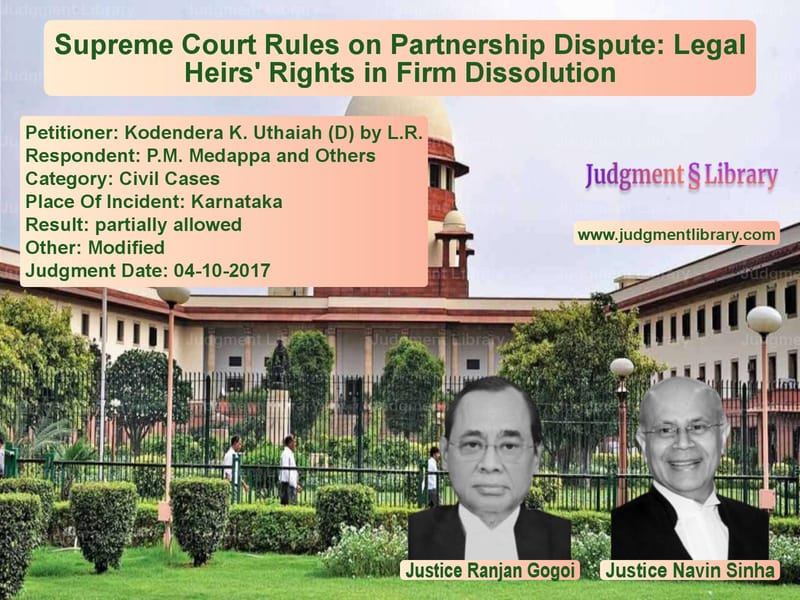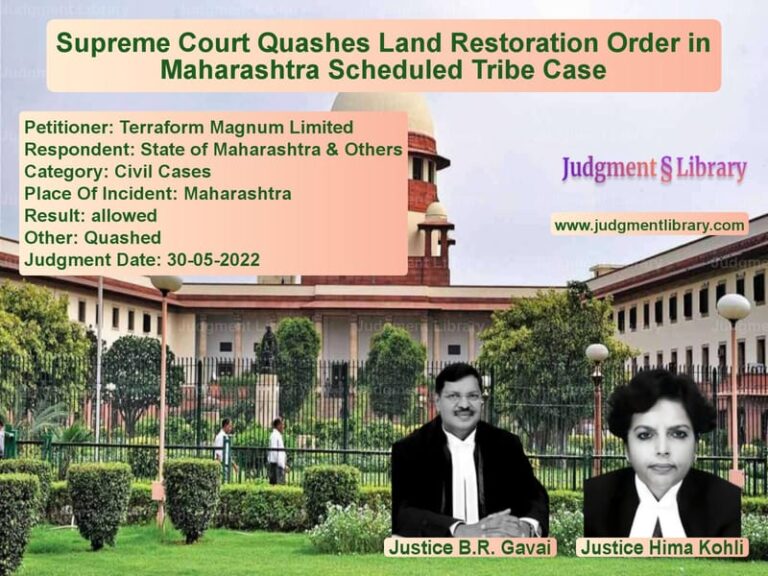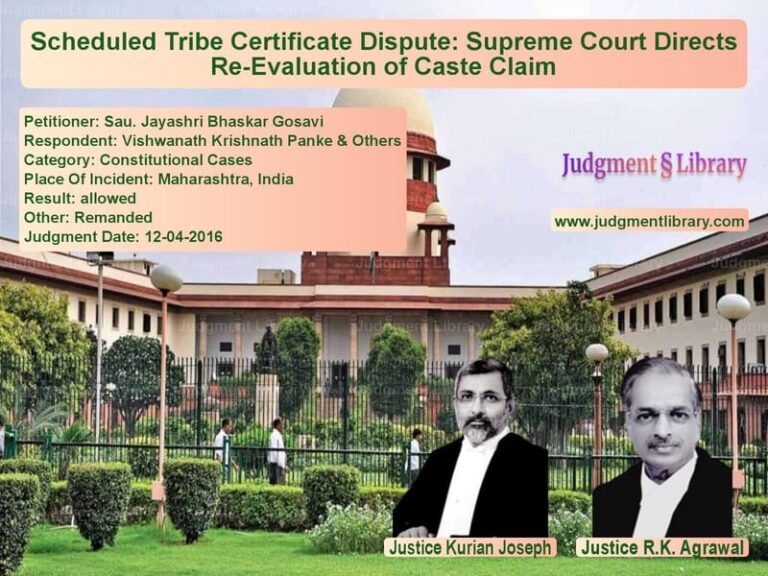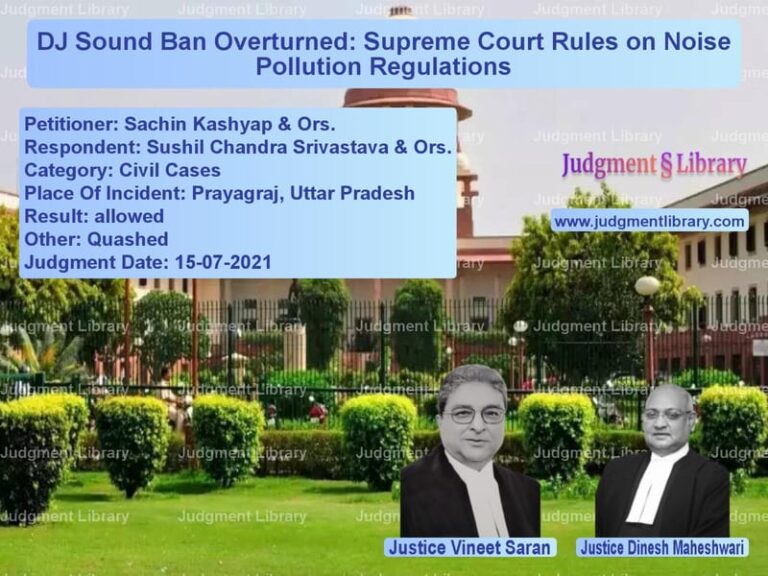Supreme Court Rules on Partnership Dispute: Legal Heirs’ Rights in Firm Dissolution
The Supreme Court of India recently ruled in the case of Kodendera K. Uthaiah (D) by L.R. vs. P.M. Medappa and Others, addressing crucial aspects of partnership law, dissolution, and the rights of legal heirs in a partnership firm. The dispute revolved around whether the legal heirs of a deceased partner were entitled to a share in the firm’s assets and profits, and whether the partnership should be dissolved.
The case involved a registered partnership firm, M/s Rums & Co., formed in 1971, with a clause in its deed specifying that in the event of a partner’s death, the remaining partners had the option to purchase the deceased partner’s share by issuing a written notice within three months. The litigation arose when the surviving partners failed to pay the deceased partner’s legal heirs, leading to a demand for firm dissolution and settlement of accounts.
Background of the Case
The dispute began after the death of P.M. Medappa on July 27, 1990. The remaining partners—defendants in the case—issued a notice under Clause 14 of the partnership deed, offering to purchase the deceased’s share. However, the legal heirs, including the plaintiff, alleged that the partners failed to make the necessary payments, leading to a legal battle for dissolution and settlement of accounts.
The trial court ruled partially in favor of the plaintiff, holding that the legal heirs were entitled to a 1/4th share of the firm’s assets based on the last annual accounts, with interest at 10% per annum. Dissatisfied with this partial relief, the plaintiff appealed to the High Court, which ruled in favor of full dissolution and settlement of accounts “as of date.” The decision was challenged by the defendant, bringing the case to the Supreme Court.
Arguments of the Appellant (Defendant)
The defendant argued that:
- The notice dated October 15, 1990 was served properly, and the legal heirs had no grounds to reject it.
- The partnership deed’s Clause 14 clearly indicated an intention for the firm’s continuity, negating the application of Section 42(c) of the Partnership Act, which provides for dissolution upon a partner’s death.
- Section 37 of the Partnership Act, governing profit-sharing after a partner’s death, was not applicable since the partnership deed had a specific clause defining how the deceased’s share should be handled.
- The firm’s remaining partners were always willing to pay the legitimate dues, but the plaintiff insisted on introducing the deceased partner’s wife into the firm.
- Delays in payment were due to ongoing litigation, and there was no intentional attempt to withhold dues.
Arguments of the Respondent (Plaintiff)
The plaintiff countered that:
- The notice under Clause 14 was not served on all legal heirs, rendering it ineffective.
- The surviving partners failed to pay the legal heirs despite multiple requests.
- On May 31, 1991, the plaintiff requested the firm’s balance sheet, but the partners falsely claimed that auditing was incomplete.
- The audited accounts had been finalized by October 31, 1990, yet the surviving partners refused to pay the deceased partner’s rightful share.
- The High Court was correct in ordering dissolution and settlement of accounts “as of date.”
Supreme Court’s Key Findings
The Supreme Court analyzed the evidence and ruled that:
“Clause 14 of the partnership deed provides for determination of the purchase price of the share of the deceased partner on the basis of the last annual general account with interest at 10% per annum up to the date of purchase. Admittedly, no final accounts till the date of death have been furnished, much less purchase of the share of the deceased has been made till date by actual payment of the legitimate 1/4th share to the legal heirs.”
The Court ruled that:
- The delay in payment was not justified, as the partners had access to the firm’s financial records.
- The legal heirs were entitled to their share from the date of the partner’s death with interest at 10% per annum.
- Clause 14 was operational, and the partnership was not automatically dissolved upon the partner’s death.
- The legal heirs were not entitled to a share in profits after the deceased’s passing.
Final Judgment
The Supreme Court ruled:
“The finding that Clause 14 of the partnership deed was not complied with and therefore never became operational is held to be unsustainable and is set aside. The consequential direction for dissolution and settlement of accounts ‘as of date’ for that reason is also set aside.”
However, the Court upheld the High Court’s order allowing the plaintiff to seek appointment of a receiver for managing the firm’s assets pending settlement of accounts. The Court also allowed the plaintiff to withdraw the deposit made before the Court, which would be adjusted against the final dues payable to the legal heirs.
Key Takeaways from the Judgment
This ruling sets a significant precedent in partnership law:
- Continuation of Partnership: The Court affirmed that if a partnership deed contains provisions for continuance, the firm does not dissolve upon a partner’s death.
- Enforcement of Partnership Agreements: The Court upheld the validity of contractual clauses that dictate financial settlements for deceased partners.
- Obligation to Pay Legal Heirs: Surviving partners must fulfill financial obligations under the partnership deed in a timely manner.
- Interest on Delayed Payments: Legal heirs are entitled to interest on their dues if payments are delayed without justification.
Conclusion
The Supreme Court’s decision in Kodendera K. Uthaiah (D) by L.R. vs. P.M. Medappa and Others reinforces the importance of honoring partnership agreements while balancing the rights of legal heirs. The ruling clarifies that while firms can continue operations after a partner’s death, surviving partners cannot indefinitely withhold payments owed to legal heirs. This judgment serves as an essential precedent for partnership disputes and estate claims in business firms.
Don’t miss out on the full details! Download the complete judgment in PDF format below and gain valuable insights instantly!
Download Judgment: Kodendera K. Uthaiah vs P.M. Medappa and Oth Supreme Court of India Judgment Dated 04-10-2017.pdf
Direct Downlaod Judgment: Direct downlaod this Judgment
See all petitions in Contract Disputes
See all petitions in Succession and Wills
See all petitions in Damages and Compensation
See all petitions in Judgment by Ranjan Gogoi
See all petitions in Judgment by Navin Sinha
See all petitions in partially allowed
See all petitions in Modified
See all petitions in supreme court of India judgments October 2017
See all petitions in 2017 judgments
See all posts in Civil Cases Category
See all allowed petitions in Civil Cases Category
See all Dismissed petitions in Civil Cases Category
See all partially allowed petitions in Civil Cases Category







